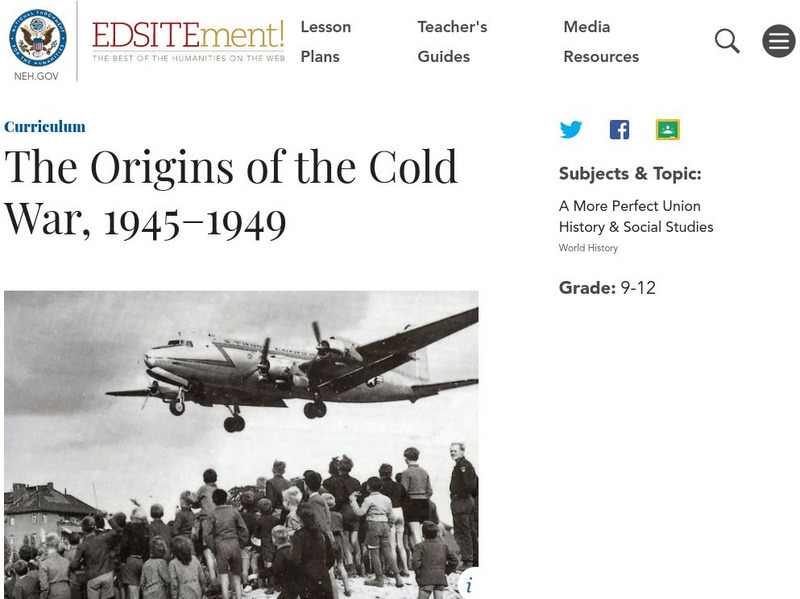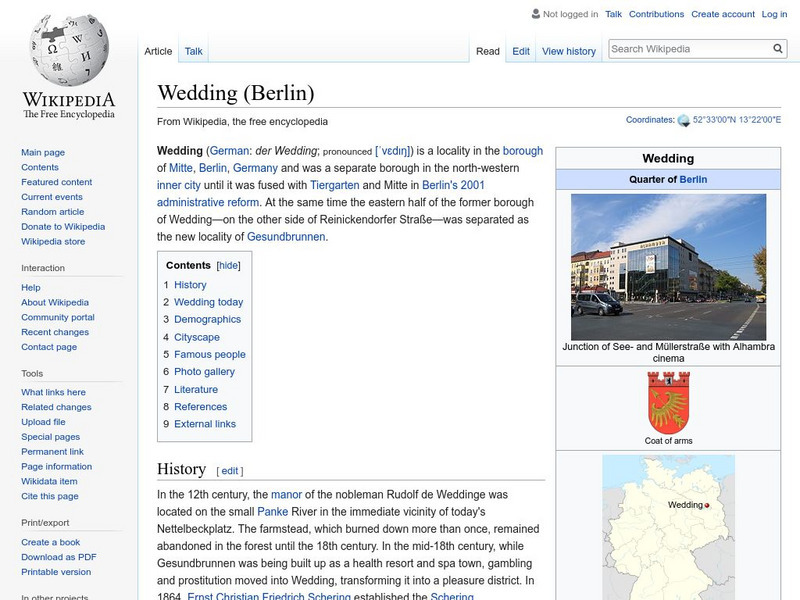University of California
Roots of the Cold War
When and how did the Cold War begin? To answer this question, you will not find a better-organized, in-depth, activity- and inquiry-based resource than this! Executing best teaching practices throughout, each portion of this inquiry...
Curated OER
The Cold War Era (1945 - 1991)
Provide learners with an excellent resource focused on the Cold War Era. Starting in 1945 and going all the way to 1991, the Cold War Era included major historical events, such as the Berlin Wall, Warsaw Pact, the Korean War, and the...
University of California
The Cold War (America)
The Cold War—with its roots in World War II—impacts the world today. Using an extensive curriculum, scholars consider its impact through primary sources, including speeches and propaganda, as well as other skills-enhancing activities. An...
BAE Systems
The Cold War
The Soviet Union's decision to block West Berlin from access by the Western allies began an international hostility that extended into the rest of the twentieth century. Class members examine both Harry Truman's and Joseph Stalin's...
Teach It History
Crisis in Berlin: Decisions Game!
The Cold War did not begin with a bang, but with a swift tactic that reflected the Soviet Union's growing distrust of its former Allies. High schoolers choose either the USA or the USSR in a role play activity as they analyze why each...
Constitutional Rights Foundation
The Cold War: How Did It Start? How Did It End?
What is the difference between a Cold War and a Hot War? Scholars research the beginning of the Cold War. They analyze diary entries as well as excerpts from various events during the 45-year standoff. To finish, they prepare final...
Curated OER
Exploring US Foreign Policy after WWII--The Cold War
Scholars explore U.S. Foreign Policy and Cold War ideologies adopted after WWII. They conduct Internet research on a topic or issue related to the Cold War Era, watch two films, and compose a time line and a multimedia presentation to...
PBS
Pbs American Experience: Race for the Superbomb
This site explores the Cold War race to develop the hydrogen bomb, a weapon that would change the world. Content details all the people who were involved in the race for the H-Bomb, as well as notable events during this time period....
PBS
Pbs: American Experience: The Berlin Airlift
A comprehensive overview of the Berlin Airlift provides links to maps, timelines, and other resources. The entire film is not available at this time, however, a short clip can be viewed. Coverage of the Chocolate Pilot and the support by...
Smithsonian Institution
National Portrait Gallery: The Presidency and the Cold War
View videos, photograph, and renderings of American presidents and their foreign counterparts in this image-rich examination of the post-World War II environment and the cold war that followed it. Includes a review of key foreign-policy...
The Guardian
Guardian: Russians Cut Vital Supplies
This article discusses the beginning of the Berlin Blockade. (June 25, 1948)
NPR: National Public Radio
Npr: Berlin's Historic Airport Faces Closure
NPR correspondent Kyle James discusses the potential closure of the Tempelhof Airport in Berlin. (January 29, 2008)
Google Cultural Institute
Google Cultural Institute: Visions of Division 1945 1989
Photographic account of the Cold War in Germany, from the Berlin blockade to the fall of the wall in 1989.
Smithsonian Institution
National Portrait Gallery: The Presidency and the Cold War: Harry Truman
The National Portrait Gallery explores presidendtial actions in regard to the Cold War. Click on Harry Truman to see what actions and decisions he made during his term of office. Read about his meeting with Joseph Stalin at Potsdam, the...
Harry S. Truman Library and Museum
The Berlin Airlift: June 27, 1948 to May 12, 1949
This site offers an abundance of information about the Berlin Airlift. Along with general information, the site includes vocabulary related to the Berlin Airlift, and follow questions about the information presented.
National Archives (UK)
National Archives Learning Curve: Cold War
Discusses different aspects of the Cold War such as "Did the Cold War really start in 1919-1939?" and "Was the Vietnam War a turning point in the Cold War?"
Digital History
Digital History: Postwar America: 1945 1960, the Containment Policy
Digital History discusses the Containment Policy of the 1950s. Includes information on the Marshall Plan, the fate of Germany, the Berlin blockade, and NATO.
Digital History
Digital History: Years of Decision [Pdf]
This site is from a unit that covers the period from the Second World War up to the Cold War. It looks at relations between the United States and the Soviet Union and the thinking of their leaders. Students are asked to consider five...
Digital History
Digital History: Solutions to Five Crises [Pdf]
This site highlights the five foreign policy crises that needed the attention of Harry S. Truman at the end of World War II. Read about the US actions on these crises and determine how these actions affected foreign policy over the next...
National Endowment for the Humanities
Neh: Edsit Ement: The Origins of the Cold War, 1945 1949
In this Curriculum Unit, young scholars will consider "The Origins of the Cold War, 1945-1949" in 3 Lessons. The unit also includes worksheets and other student materials that can be found under the resource tab.
PBS
Pbs: American Experience: Berlin Blockade
This PBS resource has a lot of information about the Berlin Blockade that was initiated by the former U.S.S.R.
Wikimedia
Wikipedia: Wedding (Berlin)
This site provides a comprehensive look at Wedding, one of the areas under France's charge during the Cold War in West Berlin.
Other
U.s. Centennial of Flight Commission: The Berlin Airlift
This site gives readers an in-depth look at the Berlin Airlift. Examines the dates the operation took place, amounts of materials airlifted into Eastern Germany, Soviet reactions, and details of the operation. A very informative resource...
Other
German Embassy: Berlin Airlift
This site, sponsored by the German Embassy, looks at the Berlin Airlift. The piece is brief but gives a unique, German perspective. Conveys a great introduction to the topic.




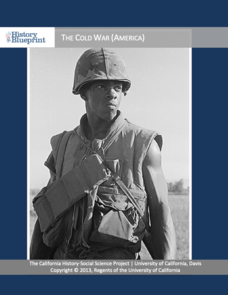



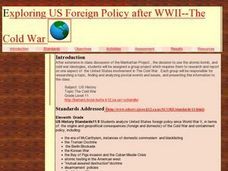


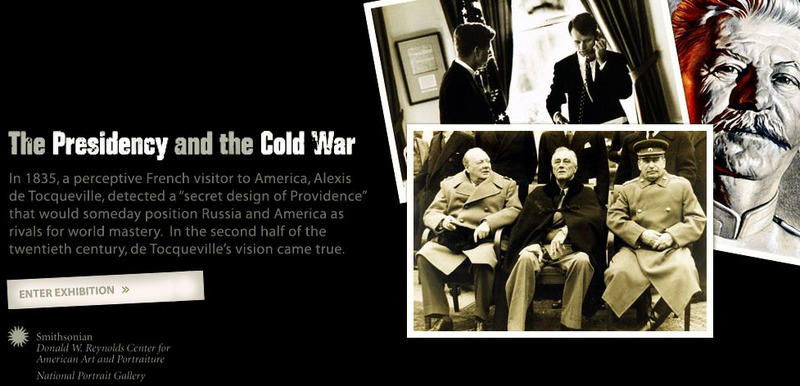
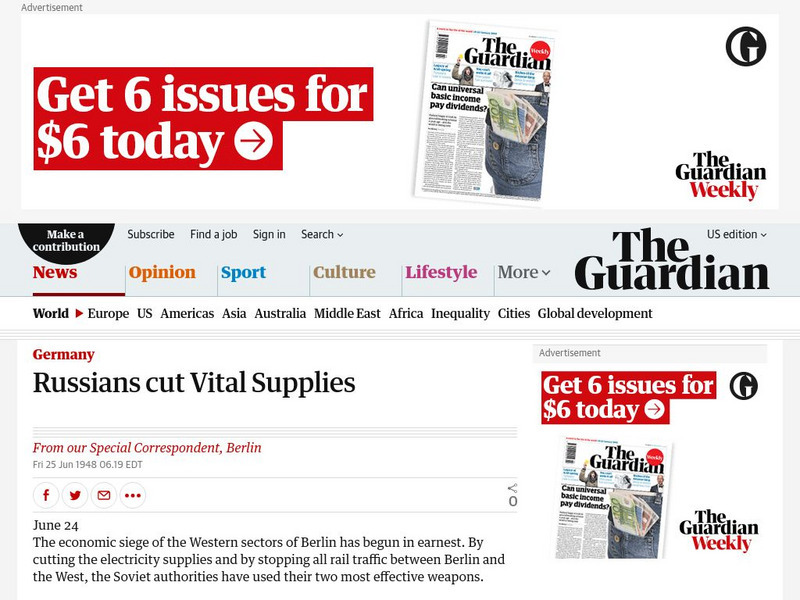
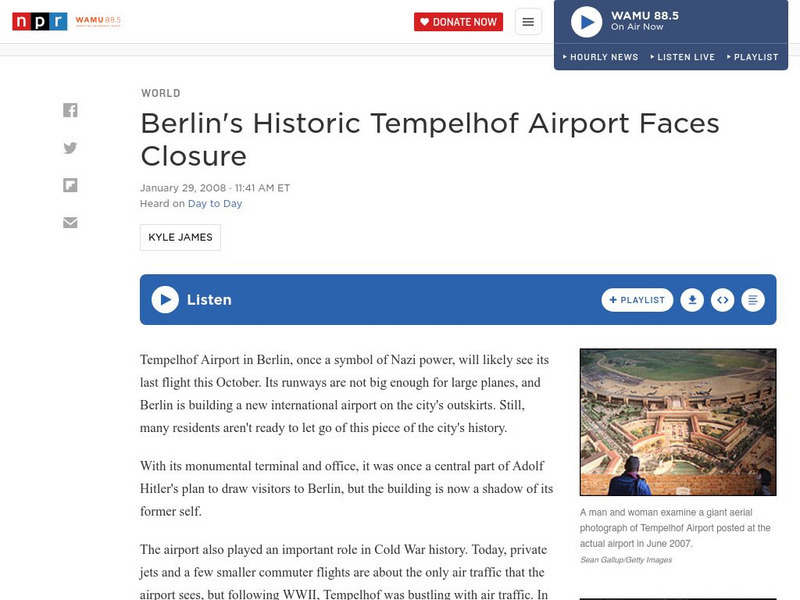


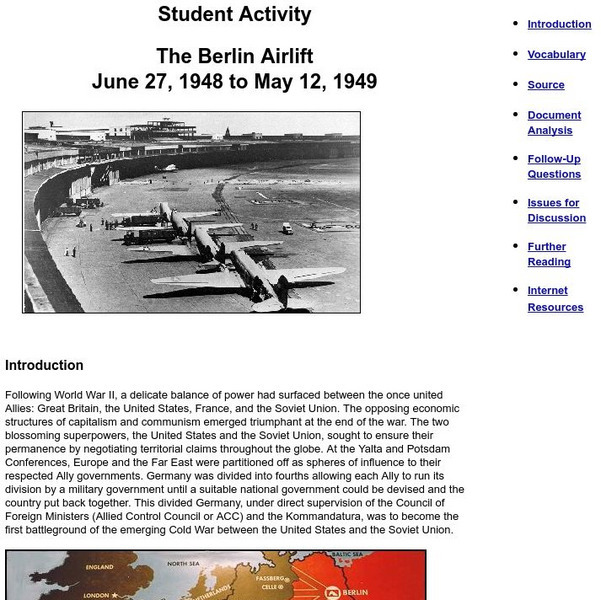
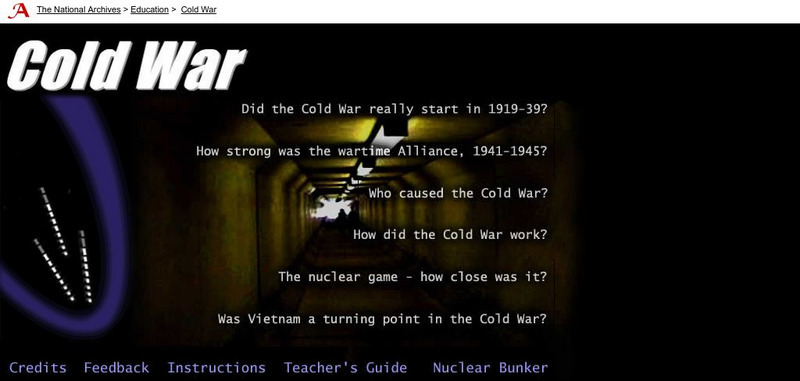
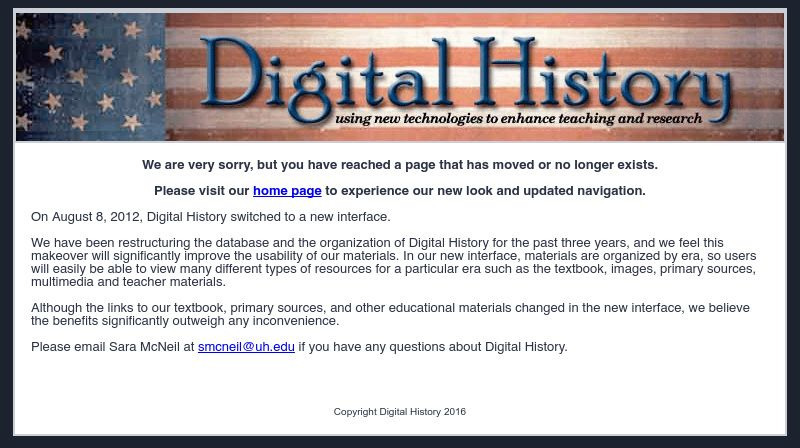
![Digital History: Years of Decision [Pdf] Website Digital History: Years of Decision [Pdf] Website](https://d15y2dacu3jp90.cloudfront.net/images/attachment_defaults/resource/large/FPO-knovation.png)
